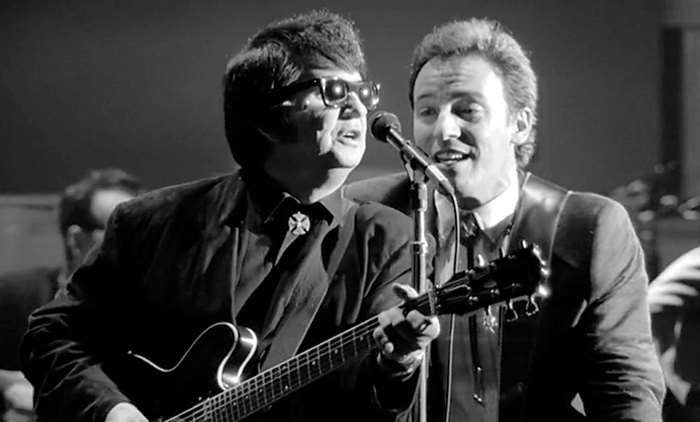Bruce on the artist
" Then into my thirteen–year–old ears came 60's pop. Roy Orbison, besides Johnny Cash, he was the other Man in Black. He was the true master of the romantic apocalypse you dreaded, and knew was coming after the first night you whispered, I love you, to your new girlfriend. You were going down. Roy was the coolest, uncool loser you'd ever seen. With his Coke bottle black glasses, his three–octave range, he seemed to take joy sticking his knife deep into the hot belly of your teenage insecurities. Simply the titles, "Crying," "It's Over," "Running Scared." That's right, the paranoia, oh, the paranoia. He sang about the tragic unknowability of women. He was tortured by soft skin, angora sweaters, beauty, and death – just like you. But he also sang that he'd been risen to the heights of near unexpressable bliss by these same very things that tortured him. Oh, cruel irony. And for those few moments, he told you that the wreckage, and the ruin, and the heartbreak was all worth it. I got it, my young songwriters, wisdom said to me: Life is tragedy, broken by moments of unworldly bliss that make that tragedy bearable. I was half right. That wasn't life, that was pop music. "
Bruce Springsteen says:
"I remember when I was a kid, his music took me out of my little town, you know. And... you don't always get a chance to sing harmony with Roy Orbison and play guitar next to James Burton, that's a dream."

"In 1970, I rode for fifteen hours in the back of a U-haul truck to open for Roy Orbison at the Nashville Music Fair. It was a summer night and I was 20 years old, and Orbison came out in dark glasses, a dark suit and he played some dark music. In 1974, just prior to going into the studio to record my album Born To Run, I was looking at Duane Eddy for his guitar sound and I was listening to a collection of Phil Spector's records and Orbison's All-Time Greatest Hits. I'd lay in bed at night with just the lights of my stereo on and I'd hear 'Crying', 'Love Hurts', 'Running Scared', 'Only The Lonely', and and 'It's Over' filling my room. Orbison's voice was unearthly. He had the ability, like all great Rock and Rollers, to sound like he dropped in from another planet and yet get the stuff that was right to the heart of what you were livin' in today, and it was how he opened up your vision. I carry his records with me when I go on tour today, and I'll always remember what he means to me and what he meant to me when I was young and afraid to love. In 1975, when I went into the studio to record, Born To Run, I wanted to make a record with words like Bob Dylan, that sounded like Phil Spector's productions, but most of all I wanted to sing like Roy Orbison. Now, everybody knows that nobody sings like Roy Orbison."